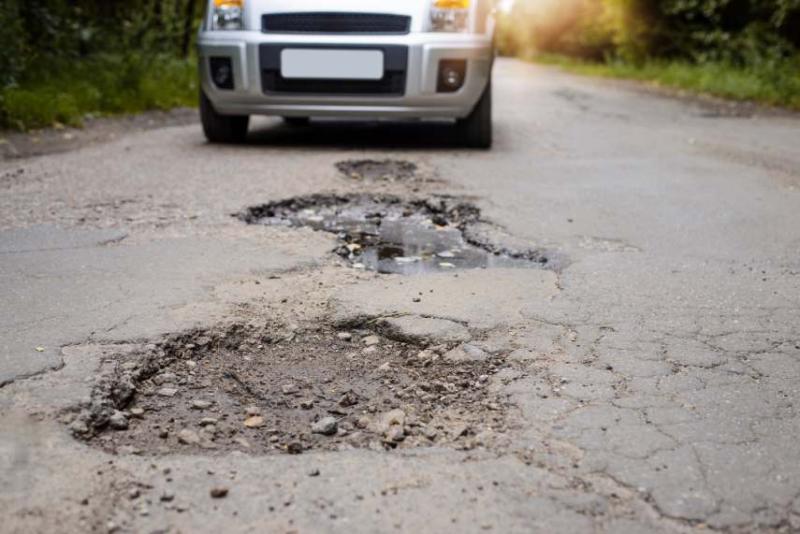
Driving over a deep pothole, especially at speed, can damage your car. Tyres, alloy wheels, steering alignment, suspension – all of these can be affected by potholes.
And as newer cars use more advanced technology, repairs can be more expensive.
We explain how to make a claim if a pothole catches your car off-guard!
What causes potholes?
Potholes are caused when water seeps into a small surface crack on the road. It can expand and create a hole.
When it's really cold, these cracks can be made worse by the water freezing and then thawing.
In the UK, we get cold and wet winters, meaning potholes are common on our roads. At Admiral, we received 46% of our pothole-related claims between January and April.*
Pothole claims are at their lowest between June and October. Then they rise again in November and December as the colder months set in.
The pothole problem
Our data shows that pothole-related claims actually went down by 20.3% in 2025, which is the first time in five years.
But that doesn’t mean the problem has gone away! If you’re a driver (or a cyclist), you probably come across potholes often on the roads.
Unfortunately, they’re very common – even on main roads and motorways.
48% of drivers told us they hit potholes at least once a week. And three in five (62%) think that hitting potholes has caused long term damage to their car.**
How to claim for pothole damage
Here’s our handy guide on how to claim compensation for pothole damage:
1. Collect your evidence
Make a note of where the pothole is, the time and date you hit it and get a photo if it’s safe to.
Then take your car to a garage for the damage to be looked at and get the mechanic’s report in writing. You’ll need this when making your claim.
2. Find out who’s responsible
You need to know who looks after the road, as different authorities could be responsible.
For example, local roads, B roads and some smaller A roads are generally maintained by the local councils in England, Wales and Scotland.
See Money Saving Expert’s full list of who’s in charge of what.
3. Report it
Now you know who’s in charge, you’ll need to make a claim. Check if the relevant council or other authority has a document that you can fill in.
Include as much information as you can, including:
- the mechanic’s report
- repair costs
- any photos you’ve taken
4. Got an offer?
Check if you’re happy with the council’s offer and whether it covers your costs. If not, you can go back to them.
You have a right to get compensation if the council or Highways Agency hasn't kept the road in good condition.
You also stand a better chance of a payout if the pothole has already been reported by someone else, and the council hasn’t done anything to fix it.
5. Offer rejected?
If you think your claim has been unfairly rejected, you can get legal advice or make a case through the courts.
Heads up, this could take some time. It’ll probably only be worthwhile if you have lot of damage and a big repair bill!
Claiming for pothole damage on your car insurance
If you have comprehensive car insurance, you can claim for pothole damage on your insurance.
But it’s worth considering the cost of the damage, your excess payments and if the claim will affect your no claims bonus.
How to prevent pothole damage
Other than reporting potholes you spot, the only way to prevent pothole damage is to keep an eye out and drive carefully.
We recommend:
- Maintaining your tyres: properly inflated tyres can help protect you when driving over a pothole, as it lowers the chance of getting a puncture.
- Driving slowly over potholes: hitting potholes at a high speed increases the chance of seriously damaging your car.
- Keeping a grip on your steering wheel: avoid veering off the side of the road after driving over a pothole by keeping your hands firmly on your wheel.
What the experts say
Graham Molsher, engineer and pothole expert, says:
“Potholes aren’t just a nuisance - they can be dangerous. A single hit can damage tyres, wheels, suspension and even knock wheel alignment out of manufactures specification, meaning safety systems like ADAS would need to be re-calibrated.”
“However, damage isn’t always obvious straight away, meaning repeated impacts can accelerate wear and tear and lead to expensive repairs, affecting how safely your car drives.”
Graham adds that spotting the signs early can save you money and hassle. Be on the lookout for:
- bulges on tyres
- new warning lights
- uneven tyre wear
- steering wheel vibrations
- strange noises
- the car pulling to one side
*Based on Admiral claims data from 2021 to 2025.
**Data collected from a consumer survey of 2,001 drivers run by Admiral Insurance in December 2025.


